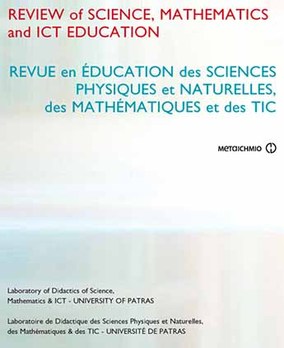Teachers’ focus on pupil’s prior conceptions in Inquiry-Based Teaching
Part of : Review of science, mathematics and ICT education ; Vol.7, No.2, 2013, pages 53-71
Issue:
Pages:
53-71
Author:
Abstract:
An important component of inquiry-based instruction is identifying pupils’ previousexperience and knowledge about phenomena under study and reflecting on itduring the investigation. This paper focuses on teachers’ ways to identify and usethe existing ideas and previous experience of pupils concerning the subject. Wemonitored to what extent teachers take pupils’ ideas - once these are revealed - intoaccount, how they reflect on them in the initial phases of forming predictions andhypotheses and how they incorporate them into their teaching. We gathered ourdata by observing in-service teachers implementing inquiry-based science education(IBSE) in their classes. These teachers, who were also interviewed, were taking partin an IBSE-training project and were teaching at junior high level of a grade school(ISCED 2). Results of the performed qualitative analysis show teachers’ difficultiesin revealing children’s previous knowledge, uncertainty how to deal with it oncerevealed and lack of flexibility.
Subject:
Subject (LC):
Keywords:
inquiry-based science education, previous experience, previous knowledge
Notes:
Περιέχει σχήματα, πίνακες και βιβλιογραφία, Ειδικό αφιέρωμα: Inquiry-Based Science Education: Theory and praxis
References (1):
- Baxter, L. M. & Kurtz, M. J. (2001). When a hypothesis is not an educated guess. Science and Children,38(7), 18-20.Bischoff, P. J. (2006). The role of knowledge structures in the ability of pre-service elementaryteachers to diagnose a child’s understanding of molecular kinetics. Science Education, 90,936-951.Bransford, J. D., Brown, A. L. & Cocking (1999). How people learn: brain, mind, experience, and school(Washington, D. C.: National Academy Press).Cohen, L., Manion, L. & Morrison, K. (2007). Research Methods in Education (New York: Routledge).De Jong, T. & Van Joolingen, W. R. (1998). Scientific discovery learning with computer simulationsof conceptual domains. Review of Educational Research, 68(2), 179-201.Driver, R., Guesne, E. & Tiberghien, A. (1985). Children’s ideas in Science (Philadelphia: Open UniversityPress).Etkina, E., Karelina, A. & Villasenor, M. R. (2007). Studying transfer of scientific reasoning abilities. InL. McCullough, L. Hsu, & P. Heron (eds), 2006 Physics Education Research Conference (Syracuse,NY: AIP), 883, 93-96.Fensham, P., Gunstone, R. & White, R. (1994). The content of Science (London: Routledge/Falmer).Fibonacci Project (2013). Disseminating inquiry-based science and mathematics education in Europe,(http://www.fibonacci-project.eu/).Glynn, S. M., Yeanny, R. H. & Britton, B. K. (1991). The Psychology of leaning Science (New Jersey:Lawrence Erlbaum Associates).Gomez-Zwiep, S. (2008). Elementary teachers’ understanding of students’ Science misconceptions:implications for practice and teacher education. Journal of Science Teacher Education,19(5), 437-454.Gooding, J. & Metz, B. (2011). From misconception to conceptual change. Science Teacher, 78(4),34-37.Harlen, W. (2000). Teaching of Science in Primary Schools (London: David Fulton Publishers Ltd).Kuhn, D. (1989). Children and adults as intuitive scientists. Psychological Review, 96(4), 674-689.Larkin, D. (2012). Misconceptions about misconceptions: pre-service secondary science teachersviews on the value and role of student ideas. Science Education, 96(5), 927-959.Lazonder, A. W., Wilhelm, P. & Hagemans, M. G. (2008). The influence of domain knowledge onstrategy use during simulation-based inquiry learning. Leaning and Instruction, 18, 580-592.Lucariello, J. (2013). How do I get my students over their alternative conceptions (misconceptions) forlearning? (http://www.apa.org/education/k12/misconceptions.aspx?item=1).Marton, F. (1981). Phenomenography – Describing conceptions of the world around us. InstructionalScience, 10(2),177-200.Monk, M. & Osborne, J. (2000). Good practice in Science teaching: what research has to say (Buckingham:Open University Press).Morison, J. & Lederman, N. (2003). Science teachers diagnosis and understanding of students’preconceptions. Science Education, 87(6), 849-869.Mulder, Y. G., Lazonder, A. W. & De Jong, T. (2010). Finding out how they find it out: an empiricalanalysis of inquiry learners’ need for support. International Journal of Science Education, 15,2033-2053.Tools for Enhancing Inquiry in Science Education (2012). (Recourses http://www.fibonacci-project.eu/) Xiaobao, L. & Yeping, L. (2008). Research on students’ misconceptions to improve teaching andlearning in school Mathematics and Science. School Science & Mathematics, 108(1), 4-7.




